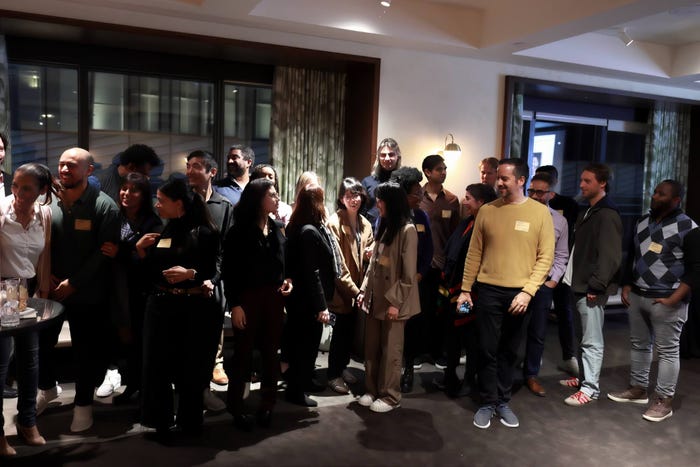NYC’s Founder Fellowship Returns with a Deeper Roster of StartupsNYC’s Founder Fellowship Returns with a Deeper Roster of Startups
Program to support more diversity and inclusivity in the innovation scene scales up to offer resources to 100 startups largely led by women and minorities.

A public-private effort in New York City to help startup founders from underrepresented communities advance their businesses got a bit bigger on Wednesday.
The Founder Fellowship program from the New York City Economic Development Corporation (NYCEDC) grew from eight startups in its first iteration to 100 in this second go-round. The City of New York ponied up $1.5 million to support the second cohort as part of Mayor Eric Adams’ Blueprint for Economic Recovery.
Aimed at further diversifying the startup and tech landscape, more than 69% of the cohort includes at least one female founder and some 80% of the teams have Black, Latin, or Asian founders.
Startup incubators, accelerators, and related programs are part of the innovation landscape in New York City -- for example, the BK-XL accelerator in Brooklyn announced last November. BK-XL focuses on local Black, Indigenous, and people of color (BIPOC) founders and was formed through a partnership of Visible Hands and the Social Justice Fund, which was established by the owners of the Brooklyn Nets.
The growth of the NYCEDC’s Founder Fellowship program included bringing in five organizations -- venture firms and incubators across the boroughs -- to work with the expanded cohort. Startups in the program gain access to free or low-cost resources such as a one-year, free WeWork All Access Basic membership.
Organizations that partnered to run the Founder Fellowship program are Chloe Capital, Company Ventures, Newlab, Tech Incubator at Queens College, and Visible Hands.
Company Ventures, which calls its program Boost, hosted a gathering on Wednesday night for its part of the cohort. One of those startups, Churpy, developed an automation platform for finance back-office workflows for reconciliation and billing. Churpy’s platform connects with banks and enterprise resource planning systems to pull and reconcile data sources.
Kennedy Mukuna, co-founder in product and operations with Churpy, said when the business started, the team spoke to some 50 CFOs who had a payments problem and needed to accept collections in every possible way among other challenges. “There’s a lot of work that goes on after payments get into businesses,” he said.
Making payments and collections run smoothly tends to be a very manual process, he said, that can be burdensome. “You’ll find very large companies with massive accounting teams,” Mukuna said, and those teams deal with accounts reconciliation, data entry from the bank, and processing invoices. “We built a platform that automates all of that.”
Through automation, he said, finance workers can be freed up to focus on strategy with insights for decisioning in their companies. The introduction of automation can often incite pushback from parties who resist change, sometimes for their job security. Mukuna said Churpy’s platform could offer other ways for staffers to contribute to their companies. “What we automate will not get anyone fired,” he said. “It will actually make people more useful. You could be way more valuable to the business if you became a thought partner to the commercial teams, for the other guys in the business who need your expertise.”
Churpy got its start at the end of 2020, at the height of the pandemic, which Mukuna said fueled interest in automation. He also said the acceleration of technology in banks, the introduction of more methods of payment creating complexity, the tightening of financial markets, and other trends have motivated Churpy’s direction.

Company Venture's Boost program is part of the Founder Fellowship. [photo by Joao-Pierre S. Ruth]
Seed-stage venture firm Company Ventures got involved in the Founder Fellowship effort supporting startups such as Churpy to help make the investment scene more equitable to take advantage of missed opportunities. “VCs are looking for incredible, brilliant entrepreneurs,” said Lindsay Siegel, head of impact with Company Ventures, during the event. “There’s also a reality that we all know that that capital movement has gone to a very slim, narrow group of people. That means we are overlooking and not finding all of the genius that’s out there that can build great, exciting companies and solve really important challenges.”
The Boost fellowship includes experts to aid founders on product strategy, go-to-market strategy, design, as well as mentors who have experience as founders.
Echoing Siegel’s remarks, Company Ventures CEO Matt Harrigan called attention to the need for continued efforts by investors to support more diversity in the startup scene. Even with Founder Fellowship underway, there remains more to do to uplift underrepresented founders in the innovation market. “The venture industry is not being appropriately built to properly acknowledge talent that doesn’t tend to come from familiar sources,” he said. “Work still needs to be done to resolve a number of the issues that contribute to that.”
What to Read Next:
Q&A: Index Ventures’ Offutt Talks Opportunity in a Mercurial Economy
Achieving Diversity: The Role IT Plays in DEI Recruiting
About the Author
You May Also Like






